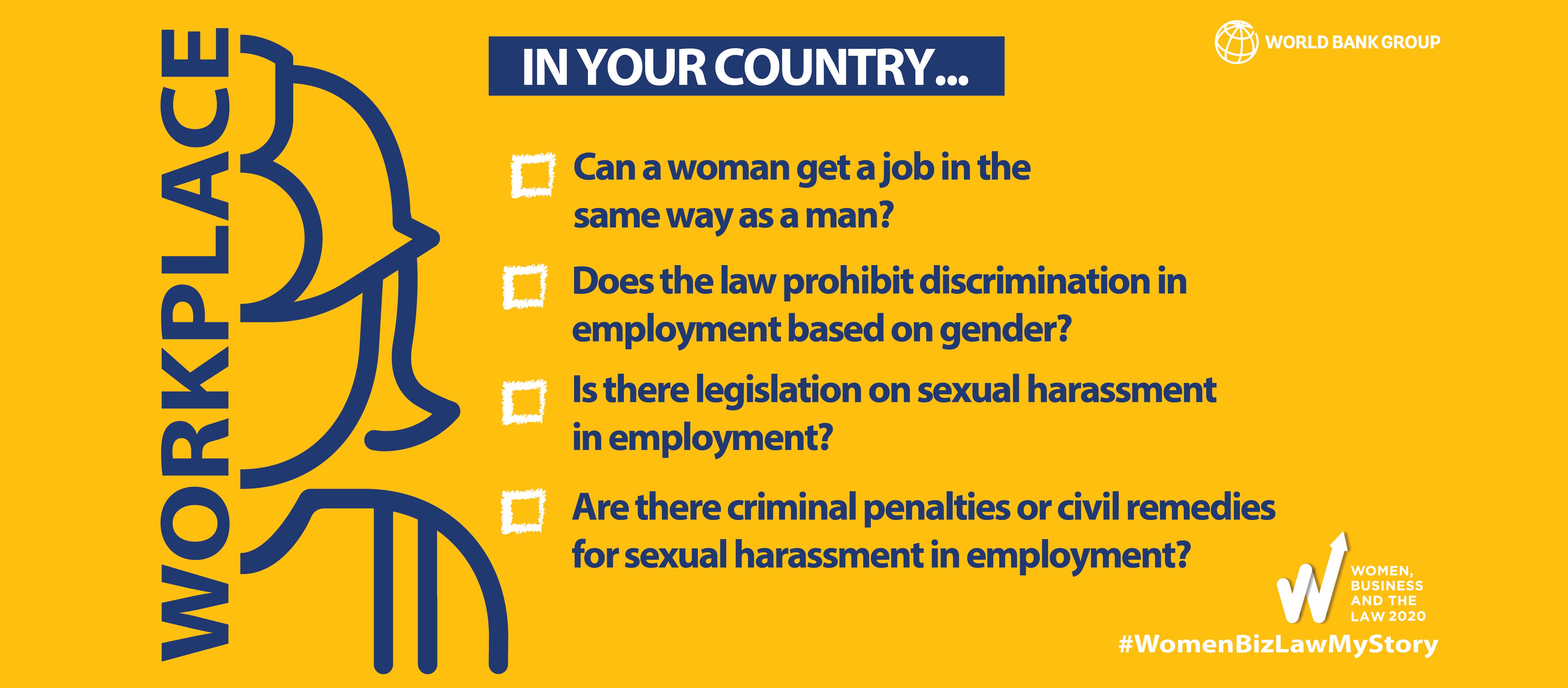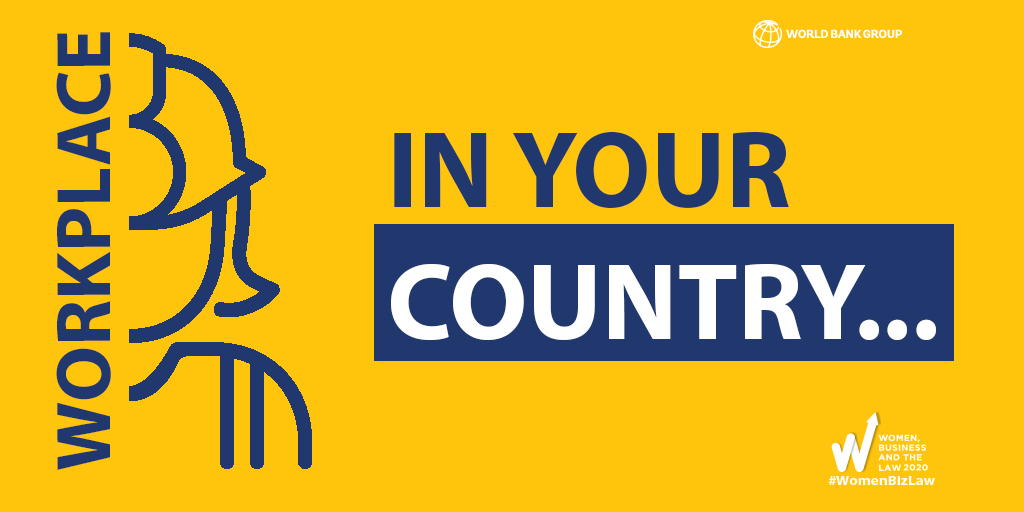 Women, Business and the Law Workplace Indicator
Women, Business and the Law Workplace Indicator
By October 2017, women were fed up. Following the exposure of widespread sexual abuse allegations in the entertainment industry, an outpouring of voices shouting #MeToo finally broke the cycle of powerlessness, of suffering in silence. The #MeToo movement gave women, not only in Hollywood, but everywhere around the world, the courage to speak out against their abusers.
For the first time, the shameful magnitude of this phenomenon was impossible to sweep under the rug. We realized that an extraordinary number of women experience sexual harassment in the workplace. It affects women in every country and across all socioeconomic levels. In the United States, for example, 60% of women reported being sexually harassed at work. In the European Union, 55% of women declared having been sexually harassed at least once, and 75% of women in a professional capacity or in top management jobs experienced sexual harassment in their lifetime. The world began to see not only how society has failed to protect women, but also where governments have failed to protect their citizens.
Women, Business and the Law highlights such gaps. After collecting data on sexual harassment for more than five years, we were encouraged to see this movement swell, both uplifting women’s voices and illuminating where sexual harassment legislation is lacking. Our recently released study, Women, Business and the Law 2020, covers 190 economies and presents and index that shows where women’s economic opportunity is restricted due to a lack of laws that prevent and redress sexual harassment in employment. In 2016, there were 131 countries with such legislation. Today, there are 140.
This is one of the biggest reform trends we’ve seen in the last two years. Since 2017, Women, Business and the Law captured 13 countries reforming in this area. Six countries – Bahrain, Barbados, Djibouti, Saudi Arabia, Tunisia, and the United Arab Emirates – enacted legislation on sexual harassment in the workplace, and included redress avenues such as criminal penalties or civil remedies. Additionally, Gabon, Montenegro, and Peru enacted criminal penalties, and France, Georgia, São Tomé and Príncipe, and South Sudan implemented civil remedies to complement existing legislation. But in 50 economies, basic legal protections are still absent.
Sexual harassment in the workplace not only is an unacceptable behavior, it is also detrimental for the economy. It impacts employees’ physical and psychological health, and also leads to higher employee turnover and increased absenteeism. Recent studies have associated it with a decrease in companies returns and profitability, and ultimately in women’s labor force participation. In fact, gender inequality and discrimination in the labor market are directly correlated with the absence of legislation protecting women from sexual harassment.
While economies are making progress in outlawing sexual harassment in the workplace, these behaviors are still largely unreported. Cultural bias in investigation and prosecution, disbelief, and negative reactions to a victim’s disclosure discourage them from seeking help. In fact, over 70% of women who have been sexually harassed at work do not report it to their supervisor, and only half of those who do feel that their complaint is properly handled.
Adopting specific legislation on sexual harassment is a first step towards removing structural inequalities in society and in the workplace. Creating a zero-tolerance culture around sexual harassment, affording due process by creating unbiased, safe, and effective redress avenues are key for survivors to tell their stories and for perpetrators to be held accountable for their crimes.
Many countries have witnessed an increase in reporting rates since the advent of #MeToo. In India, registered cases of sexual harassment in workplaces increased by 80%. In France, the number of calls to the national hotline for women victims of violence rose by 105%. In Canada, calls to the Ottawa Rape Crisis Centre went up 100% in one year alone. A study covering 24 countries even showed a 14% increase in sex crime reporting in the months following October 2017.
As millions of women continue to share their experiences of sexual harassment, a newfound commitment to implementing such laws could arise. Women, Business and the Law looks forward to documenting these changes.
So tell us: can women in your country work in the same way as men? What opportunities and challenges do you face as you move through your career? Do you have more economic opportunities than your mother or grandmother? What else needs to change to level the playing field for our daughters?
We would love to hear from you!
Post your comments below.
Or if you’re following us on Instagram or Twitter:
- Send us a photo of you with your daughter, mother or grandmother.
- Tell us: What work opportunities do you have compared to your mother or grandmother? What else needs to change to improve opportunities for your daughter? Tell us at #WomenBizLawMyStory
Or if you’re following us on Facebook or LinkedIn:
- Comment on: What work opportunities do you have compared to your mother or grandmother? What else needs to change to improve opportunities for your daughter?




Join the Conversation